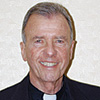(Ninth in a series) POPE FRANCIS’ REFLECTIONS on work in his encyclical, “Laudato Si’,” make a great deal of sense to me. The Holy Father gives work a broad definition. Placing work within his general view of the meaning of human life on earth, Pope Francis notes that by work he means not only manual or agricultural labor, but also any activity by human persons that alters or changes reality.

Arts and Culture
Fr. Robert Lauder is a philosophy professor at St. John’s University and the author of “Pope Francis’ Spirituality and Our Story” (Resurrection Press).
Pope Francis and The World
(Eighth in a series) IN STUDYING POPE Francis’ encyclical “Laudato Si’,” I’ve discovered that the philosophy of person that underlies Pope Francis’ theological reflections seems to be similar to the philosophy of person that I teach to students at St. John’s University.
Papal Teaching Develops
(Seventh in a series) ANYONE WHO has been reading this series of columns on Pope Francis’ encyclical “Laudato Si’” knows how enthusiastic I am about the letter and also about Pope Francis.
The best essay that I have read about the encyclical was written by Anglican Archbishop Rowan Williams, a theologian and poet, who served as archbishop of Canterbury, England, from 2002 to 2012.
Christmas Changes Everything
(Sixth in a series) ANOTHER CHRISTMAS! How the years fly by! This special day in 2015 has taken on more of a global meaning for me because of Pope Francis’ encyclical “Laudato Si’.” If I had to sum up the Holy Father’s encyclical in one sentence, the sentence would be: “Everything is connected.”
Thou and It Relationships
(Fifth in a series) IN HIS ENCYCLICAL, “Laudato Si’,” Pope Francis claims that humanity has dealt with technology and its development according to a one-dimensional model. According to this model a person is exalted who uses logical and rational procedures to exercise control over the object while neglecting the possibilities inherent in the thing itself. If this is the way we approach and deal with nature, we are misusing one of God’s great gifts to us.
The Incarnation and the World
(Fourth in a series) THE MEANING AND mystery of the Incarnation, the taking on of flesh by the Son of God, can be thought about, prayed about, read about and deeply embraced. Yet there is always more richness, insight and grace to take from it.
Communion with All Creation
(Third in a series) WRITING THIS SERIES of columns on Pope Francis’ encyclical, “Laudato Si’,” has provided for me something similar to a course on Christian spirituality. The Holy Father’s vision is simultaneously challenging and inspiring, profound and yet accessible.
The Value of Creatures
(Second in a series) RE-READING POPE Francis’ great encyclical, “Laudato Si’,” in order to write this series of columns is a labor of love. I find the pope’s writing both beautiful and inspiring. When I recommend it to others, I mention that the letter is long, but important. Early on, Pope Francis reveals his appreciation of God’s creation…
A Wonderful Vision of Reality
(First in a series) AS I BEGIN TO write this series of columns on Pope Francis’ encyclical, “Laudato Si’,” I almost don’t know how to begin. The encyclical is so important that I want to say everything I believe about it in one column. This is impossible because the encyclical deserves a book. Due to its length, the encyclical took me several hours to read. Having finished reading it, I wonder if there could have ever been a better way of spending those hours. Though demanding, the encyclical is absolutely beautiful.
Person: Contingent and Fragile
Eighth and last in a series. Re-reading Jesuit Father John Kavanaugh’s “Following Christ in a Consumer Society” has been enlightening. His insights into the contingency and fragility of the human person speak to me in a new and striking way.
